In this episode: Janet responds to an email from a mom who says that lately she has found herself yelling at her 3-year-old, who’s been having a difficult time since the birth of her brother. She realizes that yelling is not helping her daughter, and it’s not the mother she wants to be. “I’ve really lost control of this parenting thing and need a reset.”
Transcript of “Help Me Stop Yelling at My Child”
Hi. This is Janet Lansbury and welcome to Unruffled. Today, I’m responding to an email from a mom who’s found herself losing it with her 3-year-old daughter. It’s not the way she wants to react and she’s trying to find a reset.
Here’s the email I received from this parent. The subject line is “Please Help:”
“Janet, I’ve really lost control of this parenting thing and need a reset. My daughter used to be so happy and helpful, no tantrums ever. After the birth of my son, it all began to change. He is now 4 months old and my 3-year-old daughter is regularly screaming and crying. She wakes in the middle of the night and has multiple night terrors a week. I feel like I’m not helping her and finding myself yelling and threatening time out, and that’s not at all how I want to be. What can I do to get myself back on target? What resources are there? Where can I turn? My husband is also a yeller and needs some info to help him understand why that’s not actually good for our daughter. Thank you so much for your time and I look forward to your suggestions.”
The secret to parenting is perception, how we perceive our role, and how we perceive our child’s behavior and emotions. This is a very clear situation, actually. This little girl had a life where her needs were taken care of and she was comfortable. Then something changed that made her life feel very rocky and scary and different. This big change is at the root of so many of the issues that we struggle with, the basis for almost all of my consultations, and so many of the questions I’m asked, and the issues that I deal with with parents in my classes, this big transition.
It’s a very, very uncomfortable time, and it sounds like this little girl is processing it beautifully, actually. This is exactly what she’s supposed to be doing, exactly where she’s supposed to be. I would love this parent to believe that, because that will help so much.
The reason we get to the point where we are yelling when our child is upset is that we feel like there’s something really wrong going on here, that this is terrible. We’re failing. Something bad is happening and we feel out of control because we can’t fix it. We can’t make it stop. That kind of perception would send any of us over the edge and does.
The way to reset is to trust that whatever she’s expressing is always the perfect thing for her to be expressing at that time, to welcome these feelings, to roll out the red carpet for her to fall apart, and to know that you are really okay with it. This takes some meditation and thought about what we’re seeing, what we’re seeing when our child is doing these things and how we’re perceiving it, therefore, what it’s touching off in us.
Oftentimes, what can happen is that we ourselves were not allowed to share these feelings, this rage and this terror and frustration, and all the levels of feelings that children go through when they’re grieving this loss of the life that they had, and having to kind of piece it back together in this new way where, now, they’re sharing their parents and they are not their parent’s pride and joy all the time and it’s different.
Many of us weren’t allowed to express those kinds of feelings because our parents did normal things like think we were misbehaving or that this was wrong and we needed to stop, and maybe scared us or had different ways of letting us know that this wasn’t okay.
Then when our child goes to these places, it touches it off in us, touches off those repressed feelings, those unexpressed feelings that we have that we never got out of our bodies. And, whoa! Now we’re feeling it. That’s another common reason that we yell and get dysregulated as parents.
These can be cycles and can run very deep, so sometimes a therapist is a great option to help us overcover and acknowledge these experiences and feelings from our own childhoods so we’re more cognizant and aware of what we’re responding to and why.
Understanding what’s going on here is the first step. Actually, the first step is what this parent has done, which is wonderful, reaching out for help. That’s the first step. That means it is going to be fine. It is all going to work out because she cares and she knows there’s something going wrong here that she needs help with. So that’s the first step.
The next step is understanding what’s going on. There’s always a reason that children have strong feelings. There’s always a reason every single time. We can always trust that it’s just what they need to do and, of course, we’ll all need to remind ourselves, because the first thing we’re going to feel when our child feels something is: Oh, my gosh, I’ve done something wrong here. I’m not a good parent unless my children are happy and quiet and settled and smiling and I’m messing up or I’m creating a monster in this child or what happened to my beautiful girl and I’ve taken this horrible wrong turn.
We need to remind ourselves: Wait, trust the feelings, let the feelings be. That’s one of my mantras that helps me just let the feelings be. Feelings are healing. Just let them be. They’re always right. But we’re going to need that reminder. That’s one of the reasons that I also say, “Write this word on your hand,” that my mentor, Magda Gerber taught me: “acknowledge.” Because acknowledge will help you to reset in that moment, if you just acknowledge what’s going on.
You’re falling apart here about this minor thing that made her explode. It often is a minor thing that touches off the feelings so that she gets to open up the tea kettle and let the steam pour out — this healthy process that children have.
They know how to do it when they’re this young and they do get the feelings out if we allow them to. Acknowledging just what’s going on in that moment, and what you see will help you to remember. Trust the feelings and to breathe through those feelings that might be coming up in us.
But I think what really helps is practicing this in your mind, practicing visualizing the situations that make you yell, where you find yourself yelling, and really seeing them differently, really seeing her differently and what’s going on there and how healthy this is, how therapeutic it is for her to scream and melt down and cry.
The fact that she’s having night terrors shows that she’s got all this stuff that she needs to get it out. The more you can help her during the day, meaning you don’t have to do anything. You don’t have to try. You don’t have to make it happen. You can’t make it happen. You just have to remember when it is happening: Oh, yeah. This is good. That’s right. This is really, really good for her. Maybe this will even help her with the night terrors, because one of the causes is emotional stress, so we can be grateful that she’s sharing it now. She’s expressing it and she’s expressing it to people that, ideally, and this is what we’ve got to strive for, can be her therapist in this moment. Just allowing it, not taking it personally, not worrying about it, knowing it’s positive, just allowing it to be, allowing it to be all the way as much as she needs to go. Almost want it to go on longer. I know that’s the opposite of most of our intuition, but wanting it to clear itself all the way to the end.
Then this mother says she finds herself yelling and threatening time out. Yes, so that’s part of this parent getting triggered herself into a dysregulated state and that does create a sense of discomfort in our children. It exacerbates the discomfort. So then, they’re going to be taking that in from us, and then they’re going to have more that they’ll need to discharge. It’s not helping us to perceive that way and to get triggered that way and, obviously, this parent knows she’s not helping her, but that’s just another reason why doing this work to shift our perception of this is so important.
In terms of the research and the information for your husband, there is a lot of research now that shows that it does scare children particularly if we don’t repair afterward, and it doesn’t set them up well for social intelligence. It makes it more difficult for them to trust and to self-regulate. There is a lot of research out there if that’s the kind of thing that he needs.
But we can all imagine as well that we’re pretty small and vulnerable and these people that we look to as our pillars of strength to help us contain all these feelings that we have and allow us to be our messy young developing selves… and they’re yelling, they’re freaking out. It’s completely suffocating for a child in those moments. They can’t function.
So you’re definitely on the right track and again, you’ve already got the first step, which is you’re asking for help. You’re being conscious of things and you’re going to be able to turn this around, not into being some perfect parent. None of us will ever achieve that, but baby steps.
Maybe one-quarter of the time, half the time, and then, three-quarters of the time you can be centered in your perspective of her as doing positive things. Then she will calm down and she will process these feelings as she needs to.
So practice this in your mind and practice being the hero that wants her to share those feelings with you. Also knowing that that’s such wonderful bonding when you can cry with someone and yell with someone and fall apart with someone. That’s, showing yourself, turning your insides out like that and allowing them to see you. If that’s accepted and understood or at least accepted, then you receive the most validating message.
Honestly, I’ve never known a child that didn’t go through something like this. It’s positive that she’s not stuffing the feelings. She’s not afraid to share. She’s sharing. So positive.
I hope that helps.
For much more support for staying unruffled, I’ve created the No Bad Kids Master Course to give you the complete scoop—all the tools and perspective you need to not only understand and respond effectively to your children’s behavior but also build positive, respectful, relationships with them for life! Check out all the details at nobadkidscourse.com. ♥
Also, please checkout some of my other podcasts at janetlansbury.com. website. They’re all indexed by subject and category so you should be able to find whatever topic you’re interested in. And remember I have books on audio at Audible.com, No Bad Kids, Toddler Discipline Without Shame and Elevating Child Care, A Guide To Respectful Parenting. You can also get them in paperback at Amazon and an ebook at Amazon, Barnes and Noble, and Apple.com.
Also I have an exclusive audio series, Sessions. There are five individual recordings of consultations I’ve had with parents where they agree to be recorded and we discuss all their parenting issues. We have a back and forth that for me is very helpful in exploring their topics and finding solutions. These are available by going to sessionsaudio.com and you can read a description of each episode and order them individually or get them all about three hours of audio for just under $20.
Thanks for listening. We can do this.

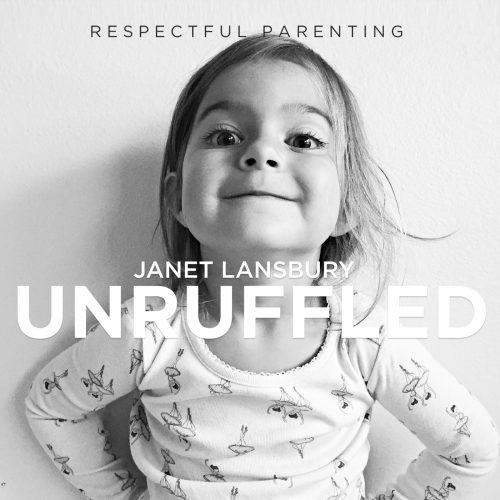




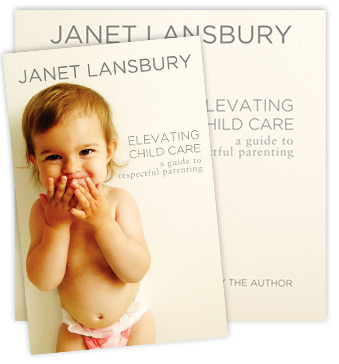

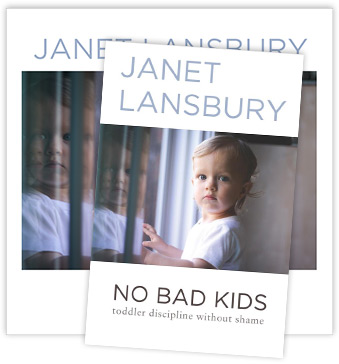


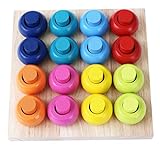
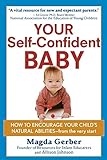


Our 2.5 year old is going through something extremely similar. It all started the moment her baby brother was born, which coincided with a change of day care for her. My question is how do you address the night terrors? At the beginning we would walk into her room and rub her back until she fell back asleep. But eventually these terrors led to multiple night wakings. It is completely heartbreaking, frustrating and exhausting. We are thinking that we shouldn’t go into her room the first time because it gives her the idea that we will continue to sooth her rather than let her sooth herself for every single wakeup. Are we damaging her if we let her cry bt herself until she falls asleep?
How do I apply this with an 11yo? I’m at my wits end with his constant need for attention. It’s been this way good whole life. Even immediately after spending time with him, moving on to something else in life will set him off. He antagonizes his sisters just to get attention. I can tell him we’re going for ice cream and it turns into a fight. Last week, after another fight, he emerged from his room holding back tears, and asked me why I hate him. (I didn’t say that to him, it was his own conclusion based on all the screaming and fighting) That was so much worse than hearing that he hates me. I’ve never been a screamer, but he just pulls it out of me. Please help. I want to love him.
What worries me more is that my immediate response was not “I don’t hate you,” but rather, “well…”